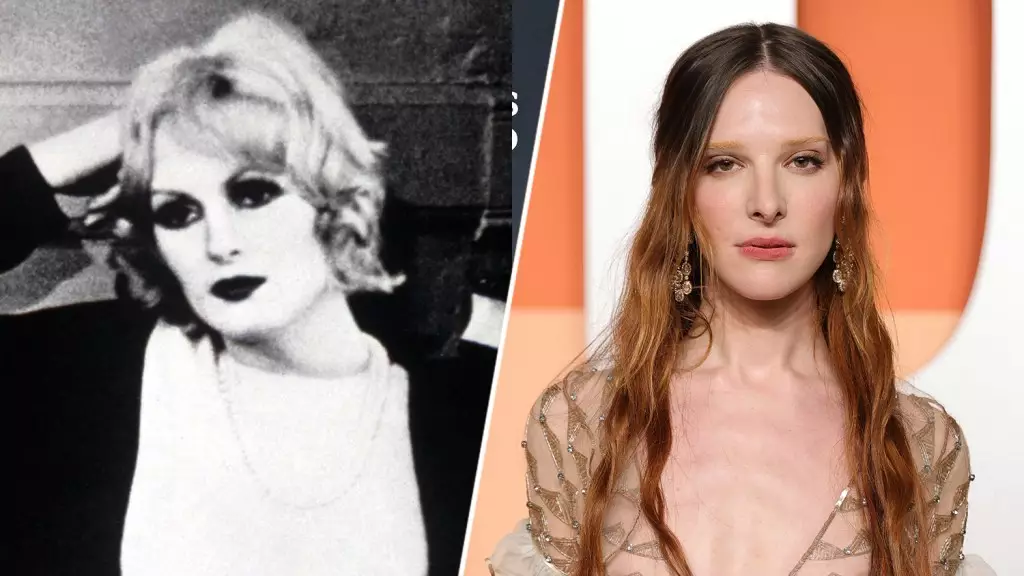In the evolving landscape of Hollywood, where stories of marginalized voices are gradually surfacing, one project stands out for its potential to reshape perceptions about trans identities. Hari Nef, an actress and model known for her vibrant presence both on-screen and off, has embarked on an ambitious journey to bring the life of Candy Darling—a pioneering trans actress and Andy Warhol muse—into the cinematic realm. After the long and winding road of development for the biopic, Nef has decided to take the reins, demonstrating not only her commitment to the subject but also an appreciation for the nuanced complexities that define both Darling’s life and her significance in LGBTQ history.
Nef’s declaration of “zero dollars and zero cents” signifies more than just a financial hurdle; it reflects the grassroots nature of independent film-making, especially when tackling stories rich in cultural significance that are often overlooked by mainstream studios. The implicit challenge to traditional filmmaking paradigms encapsulated in Nef’s comments invites a broader conversation about the importance of funding and supporting diverse narratives. By stepping in to write the screenplay herself after initial efforts faltered, Nef has taken on a formidable task of not only recreating history but ensuring that it resonates with authenticity and sincerity.
Personal Connection and Cultural Resonance
Nef’s recognition of her personal connection to Darling is a powerful element that elevates this project beyond a mere biographic retelling. The actress’s reflection on how Candy’s life, which she describes as “deeply inspirational and aspirational,” speaks to a broader experience shared by many in the trans community—a yearning for representation and validation. As the first trans actress to play a lead role in the reboot of “Transparent,” Nef recognizes the weight of her responsibility to portray Darling accurately and compassionately.
This sense of responsibility becomes particularly poignant in how Nef articulates her vision for the film. She candidly acknowledges that she doesn’t aim to create a definitive narrative on Darling’s life. Instead, she emphasizes personal interpretation, illustrating a broader movement within filmmaking to embrace storytelling that acknowledges the multifaceted nature of identity. Nef’s approach to creating a film that balances sensitivity with truthful representation invites viewers to engage with the complexities of CowDarling’s existence, as well as the societal limitations imposed upon her.
The Artistic Process: Breaking the Traditional Mold
In preparing for her role, Nef’s willingness to experiment with her appearance, such as thinning her eyebrows and enlisting the help of a hair artist, underscores an essential aspect of acting: transformation. This dedication to embodying Darling is more than aesthetic; it is deeply rooted in emotional resonance. The actress’s admission that she is open to extreme measures, including bleaching her hair, speaks to the often-unseen labor that actors invest in understanding their characters. This is crucial in a biopic about a figure like Candy Darling, whose ethereal beauty and striking charisma were central to her persona.
Moreover, the biopic is labeled a “showbiz movie,” a genre often rife with pitfalls of glamorizing or trivializing real lives for entertainment. Nef’s intention to navigate through Candy’s major roles, successes, and societal barriers will demand a delicate balance of reverence and critique but may ultimately lead to a richer depiction of an artist who existed at the fringes of acceptance. The assertion by Nef that some questions of portrayal center on “what parts of the story can you speak to?” reflects a profound understanding of storytelling’s power.
As production pushes forward, Nef’s journey serves as a beacon of hope in the continuing fight for visibility and representation of trans stories in cinema. With Darling as a central figure within New York’s cultural tapestry of the 1960s and 1970s, her story has the potential to inspire not only members of the LGBTQ community but also a broader audience seeking deeper understanding and appreciation of diverse identities. The biopic promises not just to rediscover Darling’s contributions to art and culture but also to invoke a sense of solidarity among those who feel marginalized. Nef reminds us all that, sometimes, the most profound stories come not from the grand, sweeping narratives but from the intimate, personal ones that celebrate individuality within a larger collective history.
